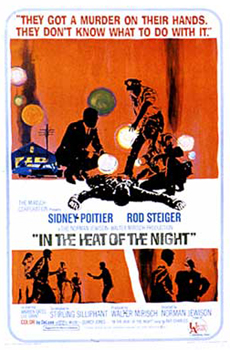In addition to Best Picture, the film also won Best Actor in a Leading
Role (Steiger), Best Film Editing (Hal Ashby), Best Sound, and Best
Writing, Screenplay Based on Material from Another Medium (Stirling
Silliphant, based on the novel by John Ball).
The movie begins on a hot summer night as a young police officer, Sam
Wood (Warren Oates) is policing his route. He finds a dead body in the
street and tells Police Chief Bill Gillespie (Steiger), who tells his
officers to round up any likely suspects. This is how Virgil Tibbs (Poitier),
who happens to be waiting for a train, gets pulled into the situation.
Of course, not only is he not responsible for the crime; he also happens
to be a homicide detective from Philadelphia. After straightening things
out with his superior officer, he reluctantly agrees to stay and help
solve the murder.
While this movie is a murder mystery with plenty of twists and turns,
it is more about the relationship between Gillespie and Tibbs, two men
from vastly different worlds. The film takes place in the South, during
a time of racial tension. As Tibbs tries to follow standard procedure,
he is met with varying degrees of prejudice from people in the community,
although the widow insists she wants him to work on the case, since
he proves more competent than the local police.
One of the most extraordinary aspects of the film is that the dialogue
is fairly sparse. The complicated relationship between Gillespie and
Tibbs is often conveyed as much through glances, inflection and body
language as it is through the words themselves, which is a realistic
portrayal of the way that prejudices manifest.
Poitier alternates between thinly-disguised righteous anger and intense
focus when he's investigating evidence. For his part, Steiger portrays
the chief as vacillating between pride, prejudice and humility, as he
begins to respect and even admire the man he initially saw as inferior.
Interestingly, one of the quirks about the chief, his penchant for chewing
gum, was a suggestion by director Jewison which Steiger initially resisted.
Reportedly, he began to love the idea and went through 263 packs of
gum during the shooting. This quirk is an interesting choice, because
it often serves as way for the chief to stall as he tries to think of
how to handle situations that he, as a small-town police chief, has
rarely faced.
Some of their interactions, including a scene at the police chief's
house, came from improvisations between the two actors, which aided
the naturalistic feel.
Stark sets and deep shadows convey a sense of uneasiness, which helps
the viewer to share the uncomfortable feelings of outsider Tibbs. The
most welcoming space he finds, with a local family, is a very run-down,
not terribly homelike dwelling. While the film was shot on location,
it was actually shot in Sparta, Illinois, not Mississippi. The name
of the town was changed to Sparta to avoid the necessity of changing
local signs.
It would be nice to believe that racial issues were a thing of the
past, but sadly, they're not. While the social conditions have changed,
the message is still relevant today in this thought-provoking, engaging
film. There's little surprise why this is Poitier's favorite of his
films.


